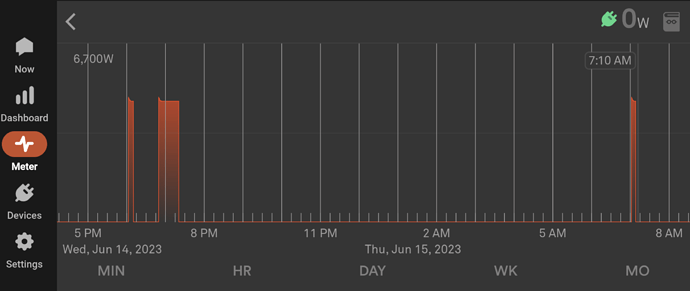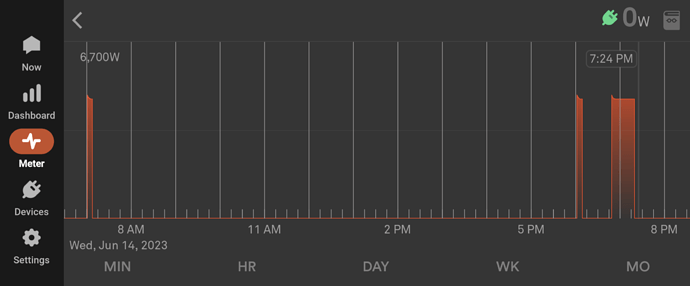Aquanta web site. I'm going to be replacing my aging water heater soon and am thinking about getting an Aquanta as well. If you have one, do you perceive it as a good value? Does it give useful information? Does it save you money?
If it is electric have you considered getting one of the new electric hybrid ones? Some of them, like the Rheem Prestige/Platinum ProTerra series have built-in smarts.
It's in a small closet. I'd have to relocate the water heater to the garage, which would involve rewiring and replumbing. We thought about it and decided against it.
EDIT: And before anyone asks about natural gas, 1. We don't currently have a hookup for gas and 2. We have solar power so I'd like to stay electric.
I have two regular 50 gal electric water heaters.
I have them controlled by z-wave relays, and by watching electric demand, I identified that the recovery time for most of the year is about 1 hour. So I turn them on for 1 hour a day, which provides enough hot water for the entire day's needs.
I also have leak sensors by each tank and a zigbee water valve.
I was very interested in Aqanta, but in the end decided that I got all the smarts I needed by doing the above. And since I have CTs on the hots for both water heaters, I have a decent idea if the elements are ok as well.
FWIW, I also flush them out once a year, and change the anode rod every 3-4 years. One of my heaters is now 11 years old, and the other is about 20 years old. Regular maintenance has kept them clean on the inside - no rust (I scoped them last year).
This is what I plan on doing with the new one. I suspect the previous owner never did maintenance. The water shutoff valve is stuck open, so I'll have to shut off the water at the main and cut the valve off after draining it. We discovered because initially I was going to just drain the heater and check the anode and the heating elements. We've since decided to not bother and to just get a new one.
I was curious, so I looked at last night's data and that seems to be about the same for us.
But as you can see the heater come on repeatedly throughout the day. Over the summer, we lost power for about 24 hours from a storm (maybe a hurricane... don't remember) and even with practically no hot water usage the water was just barely luke warm 8 hours later. That's another reason we decided to just get a new unit.
Hey... realize this is an old thread but thought I would revive it instead of starting a new one... Just got an Aquanta for a vacation house. Not so much for the learning algorithms or anything (not there enough for it to likely learn very much useful) but more to turn the water heater "mostly off" but still maintain freeze protection in the winter (it's partly a ski house and the water heater is in a crawl space) and maybe pre-heat the water when we're on our way up for the weekend.
Looks like being around for a few years at this point and all the while claiming they are "working on integrations with the major hubs" not much is coming.... Has anyone played with their Alexa integration as a back door into hubitat? I plan to mostly just use the fixed temperature mode (i.e. set it to like 45 when we're not there and something hot when we are.... maybe slightly more graceful to turn it off overnight and stuff.. not sure the payback is really there though). Got a bunch of other "keep the pipes from freezing" stuff to automate when we're away, so hoping to tie it all in from a single-click "I'm going away until next weekend" control on a hubitat dashboard via the Alexa integration to Aquanta.
Anyway... installing it this weekend.... Will update what I uncover. Just curious about others' experiences and use cases.
Here is a power meter screenshot of our new water heater (a Rheem EcoNet).
I can control it via Hubitat, and from 10pm to 7am it changes to the lowest allowed heat setting, which is 110 degrees. At 7am it goes back up to 120 degrees. You can see where someone showered at about the same time as above, 7pm, but then the heater doesn't come on again until I set it back to the higher temp in the morning. But even then, it doesn't come on for long. Here is the 12 hour period preceding the shower.
You can see where it turned up the heat at 7am and maintained the 120 degree temp all the way until the shower at 7pm. I can go back and look at this past Fri - Sun and see it turned on at 7am on Friday and then didn't turn on again until 3pm on Sunday. When we go out of town, it drops the temp to 110 and stays there until we get back. So in about a 60 hour time period, it didn't drop from 120 to 110 to trigger coming on. I know the difference is 100% that newer heaters have better insulation, and this heater is saving us about $115 per year and using about 700 kWh less per year according to my Sense data, which is a huge amount of kWh relatively speaking for our solar system. That's about 2/3 a month of production saved just for 1 appliance.
I got my Aquanta before my HE, but I've never found a true integration. Which, for the most part, is fine for me -- the Aquanta does its thing and I rarely need to alter its schedule in any way. But my wife and I work from home and maintain a pretty regular schedule, so I haven't had a great need to muck with it very much.
The one "connection" I did make between it and HE was for notifications if/when it goes offline or it detects a leak. In those cases, I've got IFTTT applets set up if either of those come up; IFTTT uses a webhook to send word to an HE end point, which acts as a trigger for a variety of notifications and turning off the water main and such. It's obviously cloud-dependent and runs slower than is ideal, but I'll still get an alert directly from Aquanta on my phone anyway, so it's basically just a backup against my direct intervention.
Aquanta does have an Alexa skill, which I have used for the occasional voice command. If I did want to trigger an automation from HE (although, again, I generally let Aquanta run itself and don't have the need to automate it further) I would just use the voice-command-as-text option from one of the Echo devices I have connected to HE.




